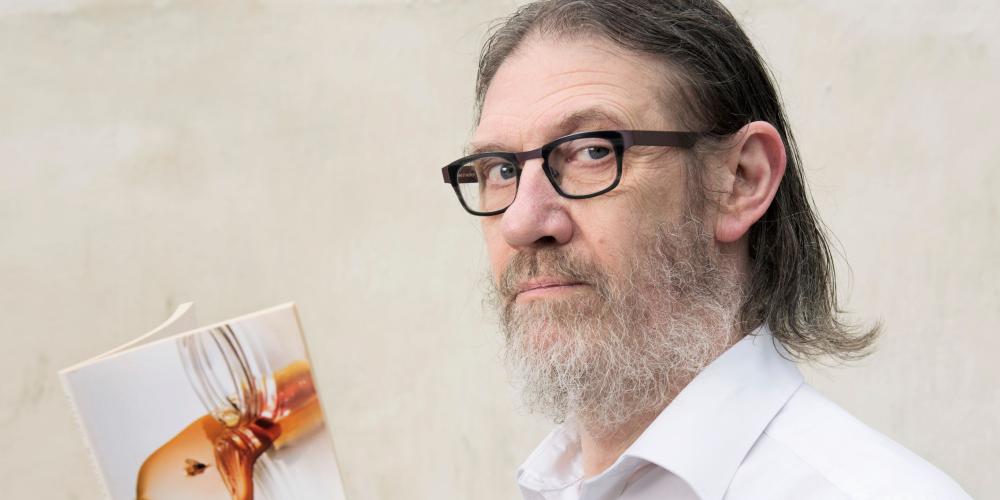
PhD in art. It has been possible for almost two decades, but what exactly it entails is obscure to many. Composer and saxophonist Peter Van Bergen recently became a doctor of arts at the Free University of Brussels and the Royal Brussels Conservatoire with a dissertation and a concert. Philosopher Jean Paul Van Bendegem was chairman and member of the jury.
Why did Peter Van Bergen receive a Doctor of Arts?
"It has everything to do with the artist himself. He applied because he felt the need to reflect on his arts. That is the core. He wants to reflect, contemplate, theorise, reflect on his work. But not every artist wants that, mind you. Because not every cabinetmaker can express himself as well as the late art connoisseur Jan Hoet. Or it doesn't suit his or her way of working. Like not every painter wants to put down their brush for a reflection, because they don't want to disturb their process."
How do you assess a PhD?
"The question is, do you want a copy of the academic standard or a personal interpretation? I am in favour of leaving it as open as possible what a final work looks like. A composer can also present his artistic work and reflection in the form of collages in his dissertation."

Saxofonist and componist Peter Van Bergen © Annamarie Ursula / CC BY-SA 3.0 (via Wikimedia Commons)
"Peter Van Bergen comments on his daily research in music. It's huge because you read about his work, his thoughts, the doubts. Am I going in the right direction, am I right, what have I started? He also uses scores and recordings of concerts for that."
"Of course, there are minimum requirements: The reader must be able to follow, so footnotes and a list of sources and/or literature are necessary. So freedom of form in the reference must also go hand in hand with respect for some basic criteria. It is appropriate that factual statements can be checked by the reader."
Peter Van Bergen investigated whether humans and computers can make music together.
"His computer is powered by signals. This could be ambient sound, or movements of a playing musician registered through special gloves. In turn, the computer produces sounds of its own. And the musicians then improvise on that."
"What that computer does is heading towards artificial intelligence. The software goes through a 'learning process'. Peter also explains in his PhD how he worked with a programmer for the software development. The computer and the sounds it presages, Peter also calls his alter ego as part of the musical process."
"Science and art can inspire each other and have done so for centuries."
"Ultimately, Peter concludes in his thesis that computers and humans can indeed make music together. But he also notes that for the audience, the audience, it is not always obvious who is making which contribution. So that leaves him with a question: can you communicate clearly, intelligibly enough to the audience? Can they know whether the human or the computer is playing and how one interacts with the other? That clarity is also needed to keep the interaction between players and audience engaging."
What is the overlap between art and science?
"It is the similarities between scientists and artists that strike me the most. Of course, the former do science: when they make a reference, they don't do self-reflection. The latter make art and do not engage in academic analysis. But they face the same challenges: they create, have resources, obstacles and an audience. That audience serves as a kind of peer review. They both grow during that making process; both may also consider taking a different path."
"What that computer does is heading towards artificial intelligence."
"The link between science and art has existed since ancient times. As a mathematician myself, I think of Simon Stevin (1548-1620 nvdr), a Flemish mathematician, who proposed calling mathematics, wis-const (as a translation of the Greek mathematica). One of his important works was called "Wisconstighe Ghedaechtenissen". Mathematics is also beauty. Science and art can inspire each other and have done so for centuries."
What is the scientific value of a doctorate in the arts?
"We should quietly move away from the idea that the exact sciences are the standard for science. I would find it weird if history, for example, had only 1 method. I think it is important to bring different approaches into the discussion. It would be good for the so-called hard sciences to also look at the human sciences. And vice versa, of course. Similarly, all scientists, regardless of discipline, can also engage with artists to inspire and enrich each other. That is the essence of the doctorate in arts."
Jean Paul will soon be seventy and his work at university will be all but over. Time for something else. "I am applying for Doctor of Arts myself. Then for once it will be a scientist-philosopher submitting to art. I am brooding on how to externalise thinking then as a cabinet of curiosities."